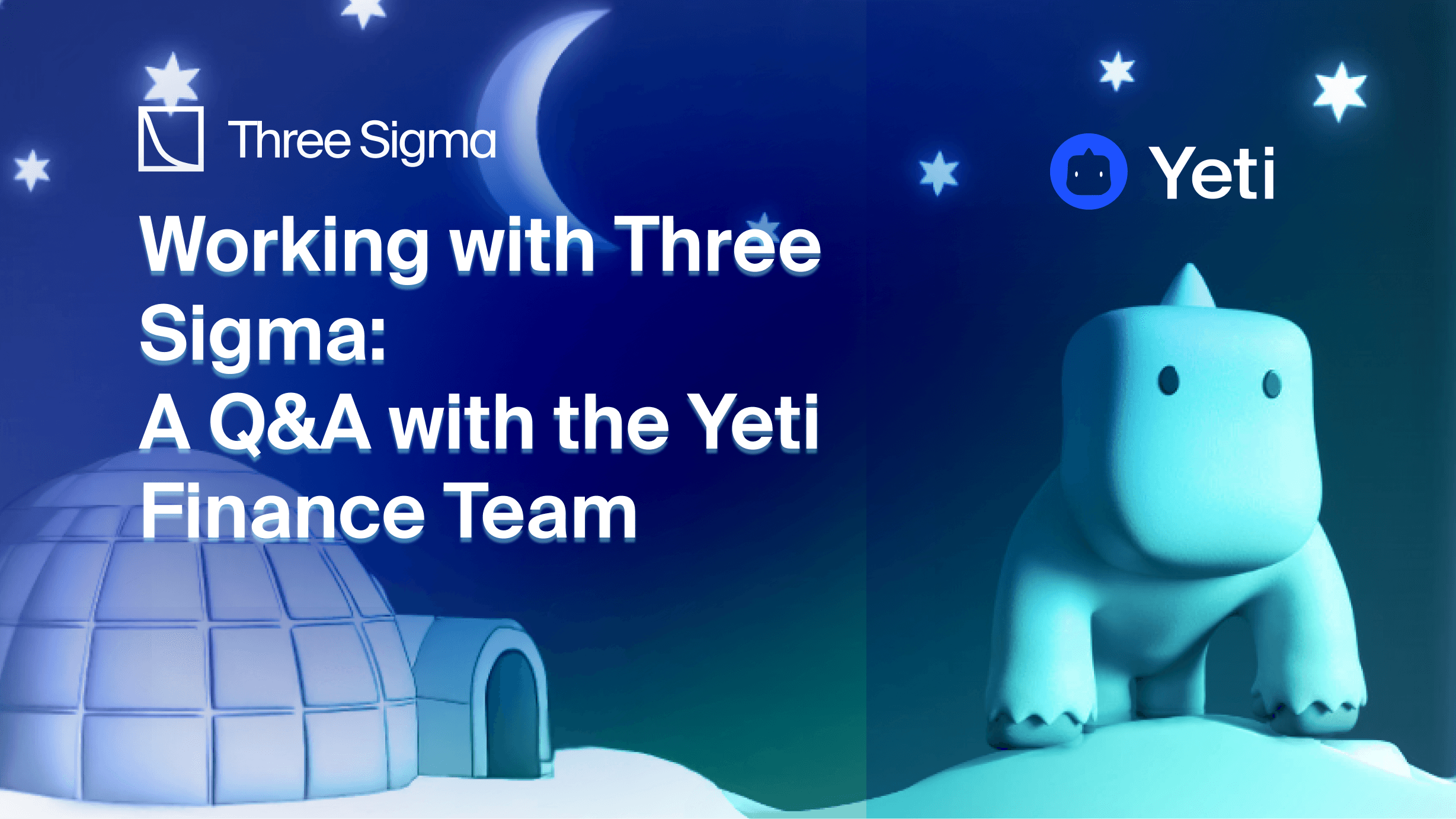Blockchain security isn't optional.
Protect your smart contracts and DeFi protocols with Three Sigma, a trusted security partner in blockchain audits, smart contract vulnerability assessments, and Web3 security.
Get a Quote Today
A Q&A with the Yeti Finance Team
Yeti Finance audit was one of the first projects Three Sigma worked with, and we are very fond of the long-term partnership that developed over the duration of the engagement.
Yeti Finance is a decentralized borrowing protocol on Avalanche that allows users to borrow against their whole crypto portfolio (LP tokens, staked assets, and base tokens). Initially modeled with the goal of being a multi-collateral version of Liquity, it quickly evolved into a project with several distinctive features, introducing innovation to the DeFi ecosystem.
We add the most value by supporting projects throughout their building lifecycle, and advising them on a wide range of topics. In the case of Yeti, we advised the team on mechanism design, utilizing rigorous quantitative research and modeling methods to optimize capital efficiency, risk, and incentives. We also audited the protocol's smart contracts and advised on implementations, ensuring that every feature was not only economically sound, but also well-implemented and secure.
Along with our long-term vision for the sector, we believe that our holistic approach, rigor, and dedication to safety and stability, all greatly benefit the projects we manage. We asked the Yeti Finance to share some feedback about their audit experience working with our team, and their kind responses are included in this post.
Three Sigma:
At what stage of development was Yeti’s protocol before the engagement?
Yeti Finance:
Before the engagement with Three Sigma, the protocol’s main code was complete (or at least we thought so at the time), but there were still some testing cases pending as well as mechanism design choices to make. Specifically, there were some edge cases around redemptions and liquidations, which became apparent due to the multi-collateral nature of the protocol. The initial engagement was for an economic security report similar to the one Liquity obtained from Gauntlet.
Three Sigma:
What services has Three Sigma provided you, and how was the iterative process between them?
Yeti Finance:
Three Sigma has been extremely helpful in both economic and code services, as well as advising and mechanism design. We commissioned two economic reports for the Yeti protocol, had one official full-scale code audit, and a large variety of smaller level items such as collateral safety reports and general advisory meetings before launch. Since then, we have been in contact often, working on things like collateral reports, trying to make the modeling engine available to test parameters through a frontend, and smaller code audits.
The iterative process has worked nicely for us since it has been quite flexible. For instance, during the meetings, while discussing protocol mechanisms, some new idea might come up, and we could run with that. We could tell that Three Sigma always had the best interest of the protocol in mind, and would do things proactively, which is always a huge plus in a space where things evolve extremely quickly. To give a tangible example on the Yeti protocol, the adjusted collateral ratio system and corresponding code implementation details were worked out closely with Three Sigma during the month of February, which we realized was necessary in response to the first economic report and other considerations like stablecoins as collateral. Three Sigma’s reports and the protocol design mechanism meetings with them were crucial to this process.
Three Sigma:
How have the results from Three Sigma’s work affected or guided Yeti’s protocol development?
Yeti Finance:
As mentioned in the previous section, the adjusted collateral ratio system was an example of a protocol mechanism which was helped greatly by analysis done by and with Three Sigma. In general, the economic reports were especially helpful in making general guarantees about the entire system and identifying scenarios to watch for, such as gas limits of the protocol affecting liquidations based on the liquidation rewards set as system parameters. Without such analysis we would be shooting more or less in the dark.
Three Sigma:
How has Yeti Finance benefitted from having a long-term engagement with Three Sigma?
Yeti Finance:
Having strong partnerships in the space is always crucial when building in DeFi. Three Sigma is a strong partner who we know we can rely on if anything happens, whether that be security concerns that appear, protocol design opinions, or anything else. That trust has been built over the months we worked with them, so that would be one of the main advantages of the long term engagement with Three Sigma.
Three Sigma:
How has the communication with Three Sigma been throughout the engagement?
Yeti Finance:
Communication has always been great with Three Sigma, very professional and clear when needed, but also the teams are very friendly with each other outside of the work.
Three Sigma:
What has surprised you the most about Three Sigma?
Yeti Finance:
What surprised us the most about Three Sigma was actually the initial report on the protocol. When we first made a request for an engagement, we had provided information over text about the protocol. We received back pages of thoughtful responses and concerns about protocol mechanisms, and ideas on how they might approach probing them with simulations. This gave us great confidence that Three Sigma was the right partner to do our economic report.
If you are searching where to start, read our article on how to choose your security partner.

Pedro Santos
Business Developer
Pedro has a Master's degree in Management with a major in Entrepreneurship from Nova School of Business and Economics. Before his MSc, he worked in privacy management in the telecommunications sector. Pedro joined Three Sigma with the goal of enhancing the company's visibility and reputation. As a business developer, he is responsible for managing relationships with external contacts and identifying potential clients and partners. Enjoys leading a disciplined life. Early bird, lover of a good morning workout, breakfast reader, eating role model, avid podcast listener, and part of the 5% at Three Sigma that doesn’t get anime.






